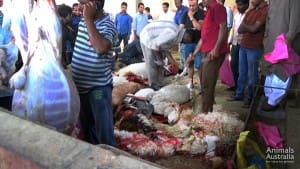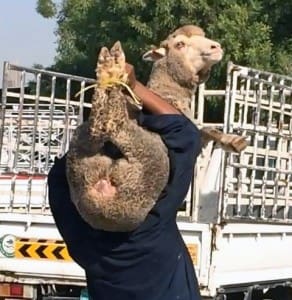NO evidence has been presented that Australian live sheep exporters deliberately or maliciously breached a supply chain assurance system in the Middle East, an industry leader has claimed.
Animals Australia this week released new footage of Australian sheep in the Middle East sold, handled and killed outside Australia’s Exporter Supply Chain Assurance System, supposedly resulting in horrific cruelty to thousands of Australian animals.
The animal rights body claimed that in Kuwait, Oman and the UAE, its investigators witnessed terrified sheep being dragged through the streets and stuffed in car boots in suffocating 48°C heat. Australian sheep were also illegally sold for backyard slaughter direct from the industry’s ‘approved’ abattoirs — in blatant contravention of Australian export laws, AA said.
Animals Australia claims are “inaccurate”
However, despite industry self-reporting of the “leakage” of Australian sheep outside ESCAS supply chains in the Middle Eastern markets, Australian Live Exporters Council chief executive officer Alison Penfold has branded the AA claims as “inaccurate.”
“There has been no finding that any exporter has deliberately and maliciously breached ESCAS. No evidence has ever been presented of such activities.
“Exporters who had supply chains in Oman and Kuwait, also had supply chains in Bahrain, Qatar and Jordan where all supply chains complied with ESCAS,” she said.
“This in itself suggests that the issues faced in Kuwait and Oman were supply chain-based and not exporter procured, an important distinction that Animals Australia has not acknowledged in its current campaign to denigrate Australian exporters.”
ALEC defends Department of Agriculture
Animals Australia has claimed it has presented sufficient evidence to Australia’s Department of Agriculture for the government to suspend live export licences. However, Ms Penfold rejected a claim by Animals Australia that somehow the department is obfuscating in its abilities and duties to penalise and prosecute exporters for breaches of ESCAS.
“Animals Australia’s claims are inaccurate and fail to understand or perhaps even respect the regulations and laws governing the trade, due process, natural justice and the basis on which Australia’s legal system operates.
“Any punishment must be proportionate to the breach or crime and be backed by fact and evidence.”
Ms Penfold said the Department of Agriculture has wide-ranging powers to impose sanctions on exporters for ESCAS non-compliances and has actively used this power since the introduction of ESCAS.
“Exporters have frequently faced significant and severe sanctions and penalties, even where allegations are unproved, or subsequently disproved, or where an alleged breach is out of its control.
“The department typically imposes costly and strict conditions on the exporter, consignment, supply chain or ESCAS arrangement as a precaution and whilst allegations are still being investigated and before any relevant breach has been established,” she said.
“Strict conditions are common and penalise exporters through supply chain restrictions, increased delay or compliance costs that severely impact the business and can cause hundreds of thousands of dollars loss.
“Prosecution and criminal sanction, or loss of license, must be proportionate to the circumstances and must involve serious misconduct by an exporter,” Ms Penfold said.
“Any decision to prosecute would be independently made by the Commonwealth Director of Public Prosecutions.
“A license can only be cancelled where the department believes that the exporter has ceased to be a person or integrity or competent to hold the licence,” she said.
Evidence doesn’t suggest exporters deliberately breach ESCAS
Ms Penfold said that although there seem to be many allegations and evidence of breaches, these do not suggest that there is a widespread failure of exporters to take animal welfare seriously or deliberately breach ESCAS.
“The absence of any criminal prosecution or loss of licence since ESCAS was introduced reflects the fact that exporter have been working hard to do the right thing and largely succeeding in challenging cultural contexts.
“Exporters should not be held responsible for the criminal conduct of a third party in a third country,” she said.
“Nor should exporters have to prove a negative to defend allegations – the burden of proof under the Australian legal system lies with the prosecution.”
Ms Penfold said ALEC stated two years ago that deliberate breaches of ESCAS should be treated with harsh penalties.
“Our position has not changed but reference to it was conveniently ignored in last night’s story and Animals Australia’s references.”




What are Penfold’s legal qualifications to be making these extraordinary assertions? Please tell us whether or not these consistent and repeated violations are strict liability offences, where there is no requirement to prove intent or malice. We can’t want to hear that one. Full names required in future for reader comments please StopTAC, as per our long-standing comments policy: https://www.sheepcentral.com/about-us/sheep-central-comment-policy/ Editor
As usual, Alison Penfold is doing her “Ostrich act” by putting her head in the sand over the evidence presented by Animals Australia on breaches of ESCAS in Muslim and Asian countries.
No one monitors the supply chains. The system is a complete failure for animal welfare. DAF hasn’t completed an investigation this year — farcical. Such a sad sick business backed by the Minister for Cruelty.